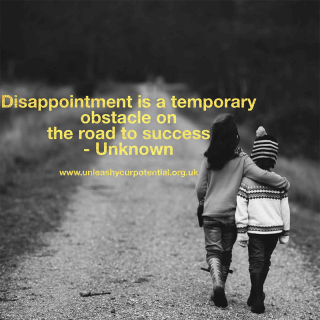Exam disappointment and disappointment in general can be one of life’s most uncomfortable feelings and
often follows expectations. The exam hall may be a distant memory as the results are posted. How can you prepare yourself if you’re about to get results? Perhaps you’re a Parent, Grandparent or Friend of someone who will shortly be getting results – maybe you’d like some tips to be able to help them if they get results that their disappointed about. In fact we all need tools in our toolbox for beating disappointment – those moments when our hopes are dashed and the weight of the universe might seem to have descend upon us …
who will shortly be getting results – maybe you’d like some tips to be able to help them if they get results that their disappointed about. In fact we all need tools in our toolbox for beating disappointment – those moments when our hopes are dashed and the weight of the universe might seem to have descend upon us …
Results day …
I can remember the day I collected my GCSE results. The anticipation of what was in the envelope. That sick feeling as I held the results envelope in my hand. I paused for a moment, I was too scared to open them in case I hadn’t got the grades I needed for the college place I had lined up. I remember feeling like the contents of that envelope had the ability to make my dreams come true or shatter them. Had I done enough to get what I needed? It was all about expectations – I desperately wanted those grades to be able to take the path I had set for myself – and then I opened the envelope …
If it’s great news then well done and fantastic – you’ll celebrate, breathe a sigh of relief and be able to enjoy the rest of the summer before the next chapter of your life unfolds as planned …
If it’s not the results you had hoped for here are some tips …
Handling exam grade disappointment …
We will all react differently; we’ll be feeing an emotional response, that’s for sure. Disappointment is complex, containing a subset of various emotions like anger, hurt, sadness, and probably many others. In many respects receiving disappointing exam grades tests our resilience (or helps up start to build it). The key is how quickly we can ‘bounce back’ and are able to think beyond the immediate negative feelings …
“Nothing Lasts for ever. Everything is temporary, even your emotions” – unknown
For many young people feelings can be compounded by the element of surprise. You’re predicted a particular set of grades but somehow even a single grade that is lower than expected takes your attention away from what might be a great overall set of results. We need to gain some perspective – don’t lose sight of the all the great work and other results you’ve received. Yes, I know it probably feels like it’s the end of the world right now, but it really isn’t – honestly …. it’s about how you look at it …we are more that our academic achievements -remind yourself of these other achievements e.g. extra curricular activities like sports, volunteering, Duke of Edinburgh, part time jobs etc.
“Don’t let today’s disappointments cast a shadow on tomorrow’s dreams.” ~Unknown
The thing is that often we wed ourselves to a particular course of action – forgetting that there many different routes to achieving what we want (in NLP we talk about behavioural flexibility – we sometimes need to remind ourselves we can change our course of action/direction – it’s ok to do that).
When we’re in the grip of disappointment our time horizon tends to be very very short. If we can lengthen our time horizon to perhaps consider what do we want for example in 5 years time we can start to see and explore that various routes to getting us there (there is always more than 1 way). Let’s say you want to be a lawyer – these days you don’t just have to go to law school, you can consider apprenticeships – both options will help you achieve the same outcome long term.
NLP Tips for handling disappointment?
If you’ve completed your certified NLP Practitioner course you’ll be aware of how:
- Putting yourself into peripheral vision helps reduce emotions – something that’s very helpful when you’re in the grip.
- Being dissociated also helps – talking about yourself in the third person is something simple that people who have yet to do their NLP training can do.
- If you’re feeling overwhelmed you can ask yourself: ‘what’s the very first thing that I need to do?’ – then get on with it – once you’ve moved out of the emotional paralysis caused by overwhelm, the world will seem less hazy and a path or course of action will become easier to spot.
- Using language to be able to help someone shift to being ‘at cause’ (rather than at the effect side of life) in order make better decisions and feel empowered to make your own choices – there is always a way.
- Master Practitioners will be aware of the Sameness/Difference Meta Programme – if someone has a preference for sameness they’ll thank you for reminding them that not everything has been thrown up into the air – they still have a family that care, love and want to support them, still got a roof over their head, still got their friends to hang out with etc.
- Watch the labels – NLP’ers will know that people can be quick to label themselves and others – and once labelled, our unconscious mind tries to live up to that expectation – we need to refrain from labelling (e.g. I am thick, I am useless at exams -all of which can be challenge by an NLP Practitioner or Master Practitioner with language or NLP processes such as the belief change process).
- Metaphors – we can use stories with a purpose in order to help someone see choice or in order to help the client change at the unconscious level (everyone loves a story!).
If you’d like some skills to be able to help your children, teams or people you know become the best version of themselves (and perhaps you’d like to help yourself in the process) maybe you might want to consider joining us for the NLP Practitioner course?


